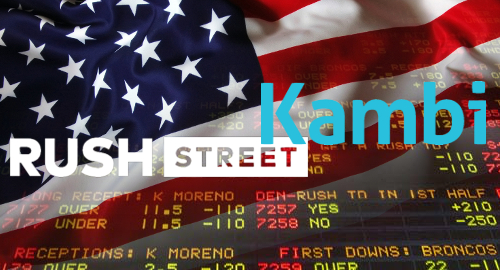 European sports betting technology provider Kambi has inked its first US-facing deal with online gambling tech outfit Rush Street Interactive (RSI).
European sports betting technology provider Kambi has inked its first US-facing deal with online gambling tech outfit Rush Street Interactive (RSI).
On Thursday, Kambi (which was spun off from Nordic online gambling operator Unibet a few years ago) announced a “multi-year” sportsbook technology deal with RSI (the online arm of brick-and-mortar casino operator Rush Street Gaming).
The deal calls for Kambi to integrate its sportsbook tech into RSI’s proprietary platform and will cover both online and retail services in the US and internationally, should RSI choose to set its sights beyond US shores at some future date. (RSI currently operates the New Jersey-licensed PlaySugarHouse online gambling site.)
Rush Street Gaming operates four land-based casinos, including the SugarHouse in Pennsylvania, which authorized legal sports wagering as part of the sweeping gambling expansion legislation approved last year.
Kambi’s release claims that another Rush Street state, New York, has also “enacted sports betting legislation” via the 2013 referendum that authorized new commercial casinos, but Gov. Andrew Cuomo suggested this week that new legislation was required in the wake of Monday’s US Supreme Court ruling that struck down the federal betting prohibition. State Assemblyman Gary Pretlow reportedly plans to introduce such legislation as early as next week.
Rush Street is the second US casino operator in as many days to announce a new sports betting tie-up. On Wednesday, Churchill Downs Inc announced a sports betting and online gambling deal with tech provider SBTech, which previously signed a similar pact with GAN.
US YOUTH WARM TO ONLINE BETTING, COOL TO CASINOS
Most casino operators appear to (correctly) view the low-margin sports betting business not as a major new revenue stream but as a way to drive additional foot traffic to their venues. But a new YouGov survey finds that operators need to position themselves for online wagering, as the youth of America view land-based casinos much as they view rotary phones or terrestrial television.
According to the survey, 50% of Americans aged 18-34 years support legal online gambling, while just 28% are opposed. Support rises to 52% in the 35-49 demo, falls to 41% of those aged 50-64 and slips to 27% among senior citizens.
In worrisome news for land-based operators, some 47% of the 18-34 bracket say they find casinos “depressing,” a figure that drops to 38% among seniors. Just one-third of millennials disagreed with the ideas of casinos as depressing places, while 49% of seniors disagreed.